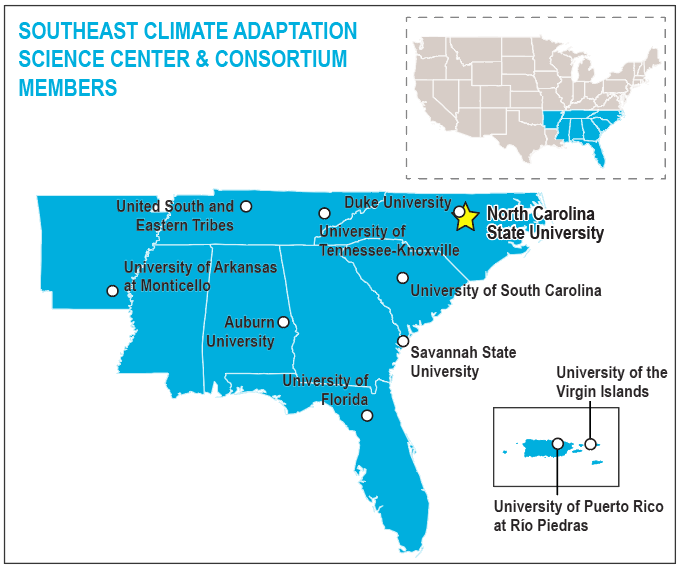NC State Will Lead New Southeast Climate Adaptation Science Center Consortium

North Carolina State University has been awarded a new cooperative agreement from the U.S. Geological Survey to continue to host the Southeast Climate Adaptation Science Center (SE CASC) for the next five years. The award caps over 12 years of success as the host organization for the Southeast Climate Adaptation Science Center. The SE CASC has evolved considerably since its initiation in 2010, from NC State serving as a sole host in partnership with USGS in Phase 1 (2010-2016) to the development of a Consortium of six universities in Phase 2 (2017-2022). With NCSU at the helm, Consortium and USGS scientists and management partners have effectively implemented co-produced science to meet the SE CASC mission: to deliver science to help fish, wildlife, water, land, and people adapt to a changing climate. Dr. Rebecca Irwin, Professor in the Department of Applied Ecology at NCSU, will continue as SE CASC University Director and Consortium lead.
In the next phase of SE CASC, the vision for the center includes a Consortium model that reaches across our southeastern footprint to meet the needs of our partners by delivering science and synthesis for climate adaptation, cultivating conversations within our communities of practice, and providing research opportunities for scientists at multiple career stages.
“Under this new phase, we are expanding our Consortium in key areas and into the western part of the SE CASC footprint to provide exceptional and broad expertise so that we can more comprehensively address partner needs,” says Irwin.
The new Consortium capitalizes on the extensive expertise of physical, natural, and social scientists from university and affiliated institutions to promote climate adaptation, as well as a vast network of natural and cultural resource partners across the region, including Tribes, local, state, and federal agencies, and non-governmental organizations.
The SE CASC Consortium now includes the following eleven institutions:
- North Carolina State University (host)
- Auburn University
- Duke University
- Savannah State University
- United South and Eastern Tribes
- University of Arkansas at Monticello
- University of Florida
- University of Puerto Rico at Rio Piedras
- University of South Carolina
- University of Tennessee-Knoxville
- University of Virgin Islands
The geographic footprint of the SE CASC is expansive, spanning eight states, six federally recognized Tribal Nations, and two territories in the U.S. Caribbean, and encompassing a range of natural and cultural resources and landscapes.

The Consortium will continue to offer unparalleled depth and expertise in co-producing actionable science for climate adaptation with managers and decision makers. We are dedicated to building capacity in the next generation of scientists and managers to address climate adaptation, focusing on skills that many managers say are still missing in their agencies.
Read a news release by the National CASC about the new agreements with the Alaska, Northwest, and Southeast CASC here.
- Categories:
